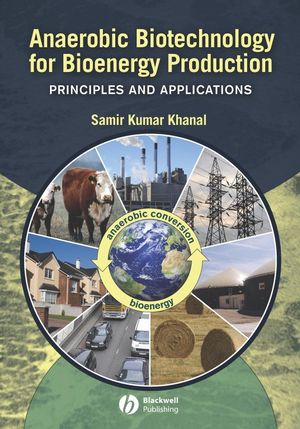Anaerobic Biotechnology for Bioenergy Production: Principles and ApplicationsISBN: 978-0-8138-2346-1
Hardcover
320 pages
October 2008, Wiley-Blackwell
 This is a Print-on-Demand title. It will be printed specifically to fill your order. Please allow an additional 15-20 days delivery time. The book is not returnable.
|
||||||
PREFACE, xiii
1 OVERVIEW OF ANAEROBIC BIOTECHNOLOGY, 1
Samir Kumar Khanal
1.1 Anaerobic Biotechnology and Bioenergy Recovery, 1
1.2 Historical Development, 3
1.3 Importance of Anaerobic Biotechnology in Overall Waste Treatment, 5
1.4 Definition and Principle of Anaerobic Processes, 6
1.5 Important Considerations in Anaerobic Biotechnology, 8
1.6 Merits of Anaerobic Biotechnology, 15
1.7 Limitations of Anaerobic Process, 22
References, 25
2 MICROBIOLOGY AND BIOCHEMISTRY OF ANAEROBIC BIOTECHNOLOGY,
29
Samir Kumar Khanal
2.1 Background, 29
2.2 Organics Conversion in Anaerobic Systems, 29
2.3 Process Microbiology, 32
References, 41
3 ENVIRONMENTAL FACTORS, 43
Samir Kumar Khanal
3.1 Background, 43
3.2 Temperature, 43
3.3 Operating pH and Alkalinity, 47
3.4 Nutrients, 55
3.5 Toxic Materials, 56
3.6 Redox Potential or Oxidation–Reduction Potential, 59
References, 61
4 KINETICS AND MODELING IN ANAEROBIC PROCESSES, 65
Keshab Raj Sharma
4.1 Background, 65
4.2 Basic Elements, 66
4.3 Stepwise Approach to Modeling, 69
4.4 Modeling of pH Change, 79
4.5 Modeling of Energy Generation, 87
References, 92
5 ANAEROBIC REACTOR CONFIGURATIONS FOR BIOENERGY PRODUCTION,
93
Samir Kumar Khanal
5.1 Background, 93
5.2 Strategies for Decoupling HRT and SRT, 93
5.3 Classification of Anaerobic Bioreactors, 94
5.4 Membrane Technology for Syngas Fermentation to Ethanol, 112
References, 114
6 MOLECULAR TECHNIQUES IN ANAEROBIC BIOTECHNOLOGY:
APPLICATION IN BIOENERGY GENERATION, 115
Srisuda Dhamwichukorn
6.1 Background, 115
6.2 Molecular Techniques in Anaerobic Biotechnology, 115
6.3 Fundamentals of Molecular Techniques, 116
6.4 Phylogenetic Analysis, 117
6.5 Molecular Techniques for Microbial Community Structure Analysis: DNA Fingerprinting, Clone Library, and Fluorescent in Situ Hybridization, 118
6.6 Molecular Techniques for Functional Analysis, 121
6.7 Nucleic Acid Extraction of Anaerobic Cells/Isolates and Sludge, 123
6.8 Molecular Techniques for Structure and Function Analysis, 123
6.9 Postgenomic Approaches for Bioenergy Research, 128
References, 130
7 BIOENERGY RECOVERY FROM SULFATE-RICH WASTE STREAMS AND
STRATEGIES FOR SULFIDE REMOVAL, 133
Samir Kumar Khanal
7.1 Background, 133
7.2 Sulfate-Reducing Bacteria, 133
7.3 High-Strength Sulfate-Rich Wastewater, 135
7.4 Methane Recovery from High-Strength Sulfate-Laden Wastewater, 135
7.5 Important Considerations in Treatment and Methane Recovery from High-Strength Sulfate-Laden Wastewater, 137
7.6 Interactions between MPB and SRB, 143
7.7 Sulfide Removal, 149
References, 157
8 BIOENERGY GENERATION FROM RESIDUES OF BIOFUEL INDUSTRIES,
161
Samir Kumar Khanal
8.1 Background, 161
8.2 Bioethanol Feedstocks, 162
8.3 Biodiesel Feedstocks, 163
8.4 Ethanol Production, 163
8.5 Thin Stillage Characterization, 171
8.6 Cassava-Based Ethanol Production, 183
8.7 Cellulose-Based Ethanol Production, 185
8.8 Bioenergy Recovery from Crude Glycerin, 186
References, 187
9 BIOHYDROGEN PRODUCTION: FUNDAMENTALS, CHALLENGES, AND
OPERATION STRATEGIES FOR ENHANCED YIELD, 189
Samir Kumar Khanal
9.1 Background, 189
9.2 Biological Hydrogen Production, 190
9.3 Microbiology of Dark Fermentation, 191
9.4 Hydrogen Production Pathway through Dark Fermentation, 192
9.5 Suppression of Hydrogen Consumers, 196
9.6 Hydrogen Yield, 199
9.7 Important Considerations in Biohydrogen Production, 200
9.8 Limitations of Dark Fermentation and Potential Remedial Options, 210
9.9 Technoeconomic Analysis of Hydrogen Fermentation, 213
References, 215
10 MICROBIAL FUEL CELL: NOVEL ANAEROBIC BIOTECHNOLOGY FOR
ENERGY GENERATION FROM WASTEWATER, 221
Hong Liu
10.1 Background, 221
10.2 How Does a Microbial Fuel Cell Work?, 222
10.3 Stoichiometry and Energetics, 223
10.4 Electrochemically Active Microbes and Electron Transfer Mechanisms, 225
10.5 Evaluation of MFC Performance, 228
10.6 MFC Designs and Electrode Materials, 231
10.7 Operational Factors Affecting MFC Performance, 239
10.8 Opportunities and Challenges for MFCs in Wastewater
Treatment, 242
References, 243
11 PRETREATMENT OF HIGH-SOLIDS WASTES/RESIDUES TO ENHANCE
BIOENERGY RECOVERY, 247
Santha Harikishan
11.1 Background, 247
11.2 Efficiency of Sludge Pretreatment, 248
11.3 Ultrasound Pretreatment, 250
11.4 Chemical and Physical Pretreatment, 257
11.5 Thermal Hydrolysis, 261
11.6 Impact of Improved Digestibility on Overall Process
Economics, 264
References, 264
12 BIOGAS PROCESSING AND UTILIZATION AS AN ENERGY SOURCE,
267
Santha Harikishan
12.1 Background, 267
12.2 Biogas Production, 267
12.3 Factors Affecting Digester Gas Production, 269
12.4 Biogas Composition, 270
12.5 Biogas Impurities, 272
12.6 Biogas Cleaning for Effective Utilization, 274
12.7 Biogas Utilization, 279
12.8 Future of Biogas as a Renewable Resource, 290
References, 291
INDEX, 293



